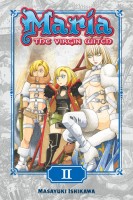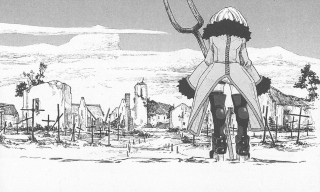 Creator: Masayuki Ishikawa
Creator: Masayuki Ishikawa
U.S. publisher: Kodansha
ISBN: 9781632360816
Released: April 2015
Original release: 2011
I was somewhat wary when I picked up Masayuki Ishikawa’s manga series Maria the Virgin Witch to read. I wasn’t really sure what to expect from it, especially considering part of the story is explicitly focused on the heroine’s virginity and sexuality. No that that is necessarily a bad thing, it just has the potential to go very wrong, very quickly. But because the series is by Ishikawa, whose Moyasimon I enjoy immensely, in the end I decided to give Maria the Virgin Witch a try. (At some point, I’ll likely take the time to watch the manga’s recent anime adaptation as well.) Although there were a few things that bothered me about the series’ first volume, by and large I was intrigued and enjoyed the manga, certainly more so than I had initially anticipated that I would. I liked the basic premise of the manga, particularly the quirky characters, and so I wanted to see what Ishikawa would do with the rest of the series. Maria the Virgin Witch, Volume 2 was first released in Japan in 2011. The English-language edition of the volume was published by Kodansha Comics in 2015.
Having drawn too much attention to herself by dramatically interfering with the affairs and wars of humankind, the young, idealistic witch Maria has been given an ultimatum by the Archangel Michael. Maria as been forbidden to display her powerful magic in front of humans or else forfeit her life. Additionally, should she ever lose her virginity she will lose her powers as a witch, putting her in a position where she must either choose her own happiness or the happiness of others. Since Michael has better things to do than spend all his time watching over a rogue witch, he leaves his messenger Ezekiel behind to ensure that Maria follows the rules. Whether Ezekiel is actually successful is another matter entirely. Maria still feels very strongly about aiding those who ask for her help and bringing an end to the war between England and France. With some assistance from her familiars Artemis and Priapus, she is able to take advantage of a few loopholes in Ezekiel’s charge, but it’s likely only a matter of time before Michael puts a stop to that, too.
 Maria the Virgin Witch continues to be a strange combination of crude humor largely revolving around sex (or the lack thereof) and more serious philosophical and theological questioning. The introduction of Ezekiel allows Ishikawa to more fully explore Maria’s motivations and her view of the world and all that she believe is wrong with it. If God and his angels won’t step in to put an end to humanity’s wars and violence—even when people are praying for just that—Maria sees it as her responsibility to fulfill that role since it is within her power, albeit in a much more limited fashion. She acknowledges that she is no god; she is not omnipotent, neither is she omniscient. She can only do what she can. The second volume of Maria the Virgin Witch reveals that Maria is very much an outlier in her way of thinking. Other people and other witches who have the ability to influence the course of the war actually want to drag it out as long as possible. To do so is to their advantage. They believe the position held by Maria to be incomprehensible and incredibly naive. But some, including Ezekiel, find that their assumptions and beliefs are challenged by Maria’s idealism and earnestness and are forced to reexamine them.
Maria the Virgin Witch continues to be a strange combination of crude humor largely revolving around sex (or the lack thereof) and more serious philosophical and theological questioning. The introduction of Ezekiel allows Ishikawa to more fully explore Maria’s motivations and her view of the world and all that she believe is wrong with it. If God and his angels won’t step in to put an end to humanity’s wars and violence—even when people are praying for just that—Maria sees it as her responsibility to fulfill that role since it is within her power, albeit in a much more limited fashion. She acknowledges that she is no god; she is not omnipotent, neither is she omniscient. She can only do what she can. The second volume of Maria the Virgin Witch reveals that Maria is very much an outlier in her way of thinking. Other people and other witches who have the ability to influence the course of the war actually want to drag it out as long as possible. To do so is to their advantage. They believe the position held by Maria to be incomprehensible and incredibly naive. But some, including Ezekiel, find that their assumptions and beliefs are challenged by Maria’s idealism and earnestness and are forced to reexamine them.
Although the series is set during the Hundred Years War and references actual events and people, the second volume of Maria the Virgin Witch makes it very clear that the manga is less historical fiction and more fantasy fiction. While interesting, the worldbuilding of the series is actually a little confused, or at least not thoroughly explained. Magic has always been a large part of Maria the Virgin Witch, as have demons, monsters, angels, and other divine beings (including Valkyries for some reason), but the second volume introduces a mythical and mortal non-human race to the mix. There’s nothing inherently wrong with this, but it seems to come out of nowhere and means that the manga loses some if its focus, which is something that is particularly important for a short series like Maria the Virgin Witch to maintain. With only one volume in the main series remaining, I’m afraid that Ishikawa may not be able to fully develop all of the elements and themes that he is trying to incorporate. Even so, I still find Maria the Virgin Witch to be an intriguing although somewhat uneven series; I’m very curious to see how it ends.

[…] Gaffney on vols. 5-6 of Lucifer and the Biscuit Hammer (A Case Suitable for Treatment) Ash Brown on vol. 2 of Maria the Virgin Witch (Experiments in Manga) Jason Thompson on vols. 1-2 of Meteor Prince (ANN) Joseph Luster on vol. 2 […]